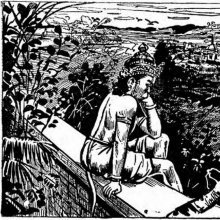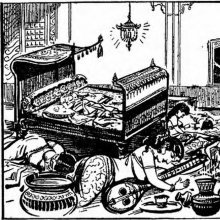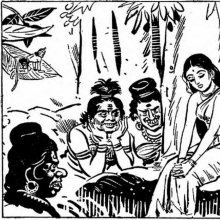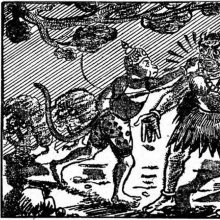Maruti, Māruti, Maṟuti: 16 definitions
Introduction:
Maruti means something in Hinduism, Sanskrit, Jainism, Prakrit, the history of ancient India, Marathi, biology, Tamil. If you want to know the exact meaning, history, etymology or English translation of this term then check out the descriptions on this page. Add your comment or reference to a book if you want to contribute to this summary article.
Images (photo gallery)
In Hinduism
Purana and Itihasa (epic history)
Source: Cologne Digital Sanskrit Dictionaries: The Purana IndexMāruti (मारुति).—Is Hanumān, of superior bhakti.*
- * Brahmāṇḍa-purāṇa III. 34. 39.

The Purana (पुराण, purāṇas) refers to Sanskrit literature preserving ancient India’s vast cultural history, including historical legends, religious ceremonies, various arts and sciences. The eighteen mahapuranas total over 400,000 shlokas (metrical couplets) and date to at least several centuries BCE.
In Jainism
General definition (in Jainism)
Source: archive.org: TrisastisalakapurusacaritraMāruti (मारुति) is another name for Hanumat (the son of Añjanā and Pavana), according to the Jain Ramayana and chapter 7.6 [Bringing news of Sītā] of Hemacandra’s 11th century Triṣaṣṭiśalākāpuruṣacaritra: an ancient Sanskrit epic poem narrating the history and legends of sixty-three illustrious persons in Jainism.

Jainism is an Indian religion of Dharma whose doctrine revolves around harmlessness (ahimsa) towards every living being. The two major branches (Digambara and Svetambara) of Jainism stimulate self-control (or, shramana, ‘self-reliance’) and spiritual development through a path of peace for the soul to progess to the ultimate goal.
India history and geography
Source: academia.edu: Minor Chiefs and "Hero" in Ancient TamilakamMaruti is a name related to the historical geography and rulers of ancient Tamil Nadu, occuring in Sangam literature such as the Akanāṉūṟu and the Puṟanāṉūṟu.—Notes: Āṭṭam-atti, Ātimanti, Kāviri-[vavval19, peruntuṟaiviḻā.

The history of India traces the identification of countries, villages, towns and other regions of India, as well as mythology, zoology, royal dynasties, rulers, tribes, local festivities and traditions and regional languages. Ancient India enjoyed religious freedom and encourages the path of Dharma, a concept common to Buddhism, Hinduism, and Jainism.
Biology (plants and animals)
Source: Google Books: CRC World Dictionary (Regional names)1) Maruti in India is the name of a plant defined with Caesalpinia bonduc in various botanical sources. This page contains potential references in Ayurveda, modern medicine, and other folk traditions or local practices It has the synonym Guilandina gemina Lour. (among others).
2) Maruti is also identified with Cleome viscosa It has the synonym Polanisia orthocarpa Hochst. (etc.).
Example references for further research on medicinal uses or toxicity (see latin names for full list):
· Phytotherapy Research (1991)
· Revisio Generum Plantarum (1891)
· Flore phanérogamique des Antilles françaises (1897)
· Prodr. Flora Indica, or ‘Descriptions of Indian Plants’ Orient. (1834)
· Fitoterapia (2003)
· Flora Brasiliensis (1865)
If you are looking for specific details regarding Maruti, for example diet and recipes, pregnancy safety, extract dosage, health benefits, side effects, chemical composition, have a look at these references.

This sections includes definitions from the five kingdoms of living things: Animals, Plants, Fungi, Protists and Monera. It will include both the official binomial nomenclature (scientific names usually in Latin) as well as regional spellings and variants.
Languages of India and abroad
Marathi-English dictionary
Source: DDSA: The Molesworth Marathi and English Dictionarymāruti (मारुति).—m (S Son of the wind.) A name of mārutīcēṃ śēpūṭa lāmbaviṇēṃ To prolong indefinitely (a work, an exaction or a demand): also, as neuter--lāmbaṇēṃ, to be so prolonged.
Marathi is an Indo-European language having over 70 million native speakers people in (predominantly) Maharashtra India. Marathi, like many other Indo-Aryan languages, evolved from early forms of Prakrit, which itself is a subset of Sanskrit, one of the most ancient languages of the world.
Sanskrit dictionary
Source: DDSA: The practical Sanskrit-English dictionaryMāruti (मारुति).—[maruto'patyam iñ]
1) An epithet of Hanumat; मारुतिः सागरं तीर्णः संसारमिव निर्ममः (mārutiḥ sāgaraṃ tīrṇaḥ saṃsāramiva nirmamaḥ) R.12. 6.
2) Of Bhīma.
Derivable forms: mārutiḥ (मारुतिः).
Source: Cologne Digital Sanskrit Dictionaries: Shabda-Sagara Sanskrit-English DictionaryMāruti (मारुति).—m.
(-tiḥ) 1. A name of Hanumana. 2. The Pandava prince Bhima. E. maruta wind, the deity, and iñ patronymic aff.; the son of the wind.
Source: Cologne Digital Sanskrit Dictionaries: Benfey Sanskrit-English DictionaryMāruti (मारुति).—i. e. marut + i, patronym., m. 1. Hanumant. 2. Bhīmasena.
Source: Cologne Digital Sanskrit Dictionaries: Cappeller Sanskrit-English DictionaryMārutī (मारुती).—relating to the Maruts or the wind.
— [masculine] wind, air, the god of wind (adj. —° [feminine] ā), [Epithet] of Viṣṇu & Rudra; [feminine] ā [Name] of a woman, [feminine] ī (sc. diś) the north-west.
--- OR ---
Māruti (मारुति).—[masculine] the same.
Source: Cologne Digital Sanskrit Dictionaries: Monier-Williams Sanskrit-English Dictionary1) Mārutī (मारुती):—[from māruta] f. ([scilicet] diś or vidiś) the north-west quarter, [Varāha-mihira’s Bṛhat-saṃhitā]
2) Māruti (मारुति):—[from māruta] m. ([from] marut or māruta) [patronymic] of Dyutāna, [Ṛgveda-anukramaṇikā]
3) [v.s. ...] of Bhīma, [Mahābhārata]
4) [v.s. ...] of Hanumat, [Kāvya literature]
Source: Cologne Digital Sanskrit Dictionaries: Yates Sanskrit-English DictionaryMāruti (मारुति):—(tiḥ) 2. m. A name of Hanumān; a Pāndu prince, Bhīma.
Source: DDSA: Paia-sadda-mahannavo; a comprehensive Prakrit Hindi dictionary (S)Māruti (मारुति) in the Sanskrit language is related to the Prakrit word: Mārui.
[Sanskrit to German]
Sanskrit, also spelled संस्कृतम् (saṃskṛtam), is an ancient language of India commonly seen as the grandmother of the Indo-European language family (even English!). Closely allied with Prakrit and Pali, Sanskrit is more exhaustive in both grammar and terms and has the most extensive collection of literature in the world, greatly surpassing its sister-languages Greek and Latin.
Kannada-English dictionary
Source: Alar: Kannada-English corpusMāruti (ಮಾರುತಿ):—
1) [noun] a son of Wind-God (either Hanumanta or Bhīmasēna).
2) [noun] Madhvācārya, the founder the Mādhva Mata, based on his own theory of dualism.
Kannada is a Dravidian language (as opposed to the Indo-European language family) mainly spoken in the southwestern region of India.
Tamil dictionary
Source: DDSA: University of Madras: Tamil LexiconMaruti (மருதி) noun See மருதூரந்தாதி [maruthurandathi] (L.)
--- OR ---
Māruti (மாருதி) noun < māruti.
1. Hanumān, as a son of the Wind-god; அனுமான். மாருதி யல்ல னாகி னீயெனு மாற்றம் பெற்றேன் [anuman. maruthi yalla nagi niyenu marram perren] (கம்பராமாயணம் அங்கத. [kambaramayanam angatha.] 13).
2. Bhīmasēna, as a son of the Wind-god; வீமன். (பிங்கலகண்டு) [viman. (pingalagandu)]
--- OR ---
Maṟuti (மறுதி) noun < மறு-. [maru-.] Undoing; செய்த தனை இல்லதாக்குகை. இந்திர னெண்ணலன் மறுதி யின்மையின் [seytha thanai illathakkugai. inthira nennalan maruthi yinmaiyin] (நீலகேசி [nilagesi], 211).
Tamil is an ancient language of India from the Dravidian family spoken by roughly 250 million people mainly in southern India and Sri Lanka.
See also (Relevant definitions)
Starts with: Marutimanjari, Marutimata, Marutinatam, Marutiprashtha.
Ends with: Agnimaruti, Cittu-vattamaruti, Irattai pey maruti, Paeyemaruti, Vattamaruti.
Full-text (+17): Agnimaruti, Irattai pey maruti, Marutimanjari, Dyutana, Marutiprashtha, Marui, Marutinatam, Pranadevaru, Petaru, Prataparudra, Cevimatu, Jholakamba-Kumba-Khamba-Khumba, Ka0 Takanem, Samani, Pratinidhi, Curanem, Agnimaruta, Avaganem, Hanuman, Apanuda.
Relevant text
Search found 19 books and stories containing Maruti, Māruti, Mārutī, Maṟuti, Maruthi, Maaruthi, Marudi, Marudhi; (plurals include: Marutis, Mārutis, Mārutīs, Maṟutis, Maruthis, Maaruthis, Marudis, Marudhis). You can also click to the full overview containing English textual excerpts. Below are direct links for the most relevant articles:
Garga Samhita (English) (by Danavir Goswami)
Verse 4.19.68 < [Chapter 19 - A Thousand Names of Srī Yamunā]
Rig Veda (translation and commentary) (by H. H. Wilson)
Rig Veda 8.12.29 < [Sukta 12]
Hanuman Nataka (critical study) (by Nurima Yeasmin)
Hanuman-Nāṭaka, Act 5 (Summary) < [Chapter 3]
8.2. Mountains in the Hanumannāṭaka < [Chapter 5]
The Agni Purana (by N. Gangadharan)
Chapter 9 - Manifestation of Viṣṇu as Rāma (part 5)
Chapter 10 - Manifestation of Viṣṇu as Rāma (part 6)
Trishashti Shalaka Purusha Caritra (by Helen M. Johnson)
Part 7: Meeting of Hanumat (Hanumān) and Sītā < [Chapter VI - Bringing news of Sītā]
Part 5: Search for Sītā < [Chapter VI - Bringing news of Sītā]
Part 3: War between the Rākṣasas and Vānaras < [Chapter VII - The killing of Rāvaṇa]
Dhanurdas < [April – June, 1980]
Fun with the Gun < [January – March, 2002]
Bonsai Culture < [January – March, 2002]



